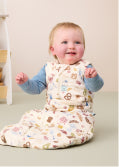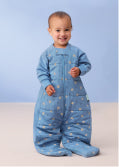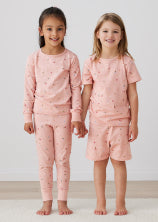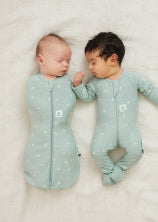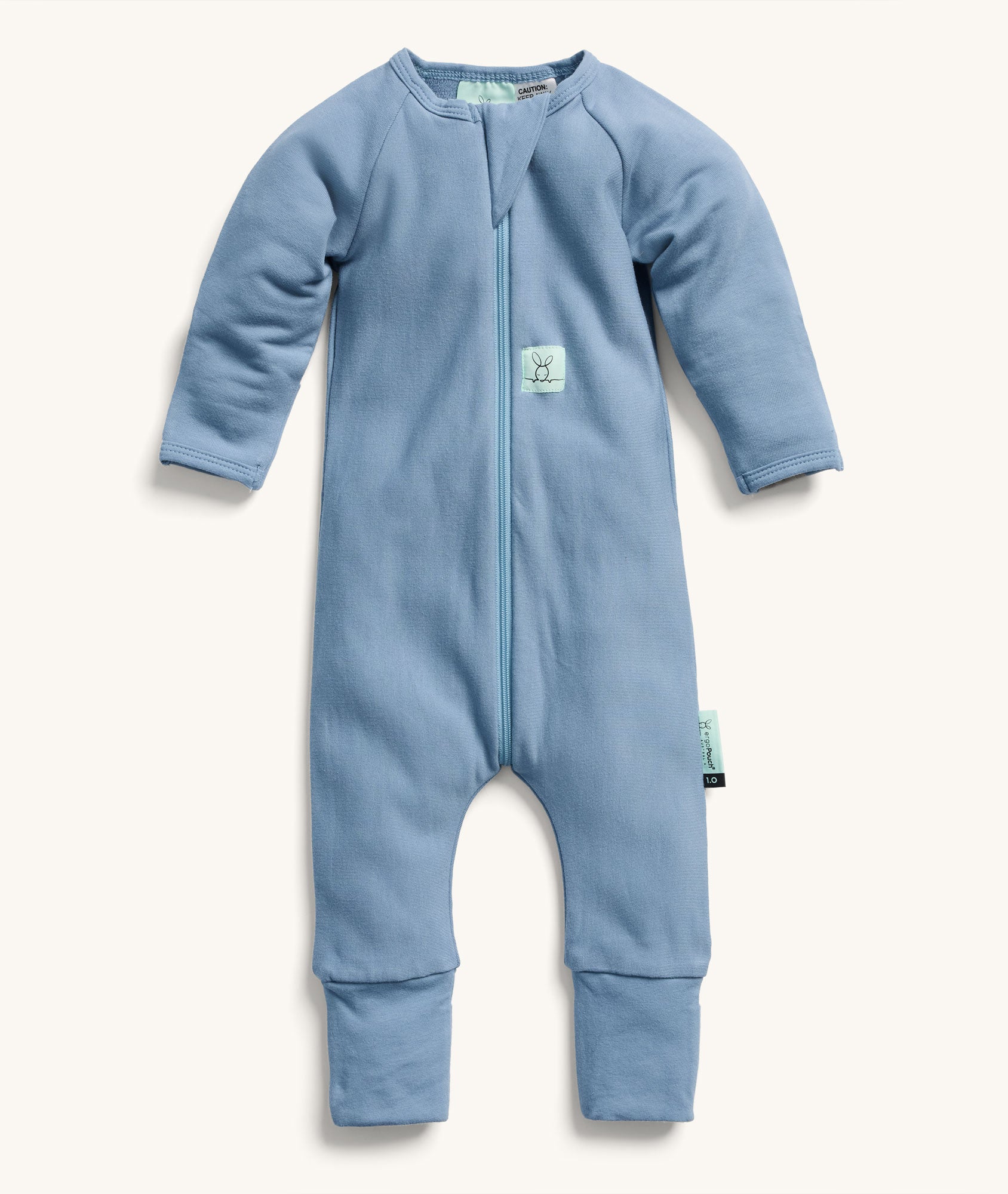
Having a sick child is often one of the hardest and most stressful times being a parent. We wish we could take the sickness for our children. However, we know that, unfortunately, sickness is inevitable for our little ones, whether this be as a baby, when they start daycare or as they grow. We know that it is common for healthy children to have up to 12 viral illnesses a year in the first few years of life (this is hard to hear as parents!).
As children grow older, the frequency of these illnesses usually decreases.
These viral illnesses can feel relentless. When babies and children catch another virus shortly after they've recovered from another one, it may feel like your little one is always sick.
In this blog, we are going to address your most common question in regards to illness, such as:
- How to tell if your baby has a fever?
- Do babies sleep more when sick?
- How to get a sick baby to sleep
- How to dress a sick baby for sleep
How to tell if your baby has a fever

It can be distressing as parents to see our babies feeling sick and with a fever. Fevers are a common symptom of various illnesses, but it's essential to know how to assess your baby's condition properly and when, in turn, to seek medical attention.
A fever is a body temperature above 38°C. Remember, fevers are often a sign that your baby is fighting off an infection (which is a positive of our clever bodies), so it is essential to provide them with plenty of rest, fluids, and comfort.
How to check baby for a fever
Check their temperature a simple underarm digital thermometer is most accurate for any age, and we have linked a trusted brand we recommend this one.
If your baby under three months old has a fever above 38°C, immediately take them to the nearest hospital emergency department.
Signs of illness and fever in babies
- Their face is hot to touch
- They look red or flushed
- They are uncomfortable or showing signs of discomfort
- Chills or shivers when their temperature is rising
- Sweating when their temperature is falling
- Vomiting
- Change in colour
- Feeding less volume or frequency than usual
- Not as active as usual and/or sleeping more (think about how we feel when we are unwell ourselves)
It is essential to monitor your child's behaviour, look for any other symptoms, such as respiratory distress or dehydration, and seek medical help.
Signs of a healthy newborn
- Normal skin colour for them
- Alert and active when awake
- Waking for feeds
- 2-3 wet nappies per day in the first 3-4 days, then at least five wet nappies a day
- 1-2 soft bowel motions per day (or their regular pattern)
- Baby is feeding at least six times per day (this will probably be more like 8-12 times a day)
- Baby is putting on weight (this will be monitored in conjunction with your trusted healthcare providers)
- Baby is breathing easily, about 40-60 times per minute

How babies sleep may change when they're sick
It's very normal for babies and children to sleep more when they're unwell. When a baby is unwell with a virus or infection, their immune system is working to fight off the infection, which can lead to increased fatigue. Sleeping helps conserve energy, allowing their body to rest, recover and heal.
However, it's important to note that the sleep patterns of sick babies can vary. While some may sleep more, others may experience disrupted or restless sleep, or have trouble falling asleep due to pain or discomfort, congestion or fever.
If you have concerns about your baby's sleep or their health, it is always recommended to take your little one to be assessed by a health professional. If your child is difficult to wake or has severe lethargy, you should seek urgent medical attention.
It's also normal for babies to be more clingy and only want to be sleep on you when unwell. It's common that your little one might be clinging to you like a koala (hello, contact naps!), and they will only sleep when they are being held. This is very common and normal for them to be more needy and clingy than usual.
Sick baby won't sleep? Here's how to help.
Firstly, if your little one is displaying signs of pain or discomfort, try administering some simple over the counter, age-appropriate pain relief such as paracetamol and/or ibuprofen. This may alleviate a sore throat, headache or an ear ache, etc. Your pharmacist or GP will be able to help guide you with the best medication to administer. Like us, when they are unwell, they might be feeling a little more restless or unsettled.
There are several things parents can do to help their sick babies sleep:
- Lots of cuddles and tender loving care can help support them to sleep.
- Decreasing noise and light
- Try bouncing, rocking, a calm lullaby, offering a soft toy comforter, and shh-pat methods. Consider a white noise machine.
- Try different positions and environments such as the pram or bouncing on a fit ball
- Lastly, try your best to be patient. It's very normal for babies to not settle as easily when they are sick.
 Does using a humidifier help?
Does using a humidifier help?
The jury is out on this one. There are pros and cons to humidifying your little one's sleep environment. Check out this blog about humidification if you would like to take a deeper dive. There is no significant harm in trying, and we always recommend you doing what's best for your unique situation.
How to help with their blocked noses
Using normal saline drops or a spray can help to loosen and clear out secretions in your little one's nose. This not only helps to alleviate discomfort, but it can also increase the likelihood that they will feed effectively. If there is copious amounts of snot, you might find it helpful to clear out their noses. There are a couple different ways to do this:
How to help with their cough at night
Cough medicines not recommended for children under the age of six years, so we recommend looking at alternative options.
There is some evidence that demonstrates honey can reduce the severity and duration of a cough. The Royal Children's Hospital (RCH) recommends, as a short-term solution, one to two teaspoons of honey taken 30 minutes before bedtime, as it may be helpful for children older than 12 months.
It's important to know honey should be avoided in children less than 12 months old, as there may be a risk of a condition called botulism.

How to dress a baby for sleep when they have a fever
The aim of dressing a sick baby is to keep them comfortable. Feel the front of their chest or back to check their warmth or coolness (it is important to note that hands and feet do not accurately indicate temperature).
If your child is very hot with a temperature, remove a layer of clothing to make them more comfortable. This is a time when the environment temperature is not as integral, and it is more important to feel your baby's temperature and adjust their clothing accordingly.
If your baby has been sweating, it is also important to change their ergoPouch Layer, Bedding, Cocoon Swaddle or Sleeping Bag if they are moist, as this can, in turn, make them cold once their temperature returns to normal.
Dressing an infant with a fever in winter
These same principles apply when dressing your baby with a fever in winter. As mentioned above, the environmental temperature is not as imperative as at other times. This is a time to tune into your baby's temperature, feel their body temperature, and dress them to keep them comfortable.
Can a baby get sick from being too cold at night?
No, they cannot get sick or catch a cold from being cold. This is a myth or an old wife's tale. Colds are caused by viral infections. For someone to be unwell with a virus, they need to be exposed to the virus. Factors such as close contact with sick individuals, poor hand hygiene and a weakened immune system can all increase the chance of "catching a cold".
It is important that babies are dressed appropriately for the temperature to keep them comfortable and reduce the risk of hypothermia.
By dressing your baby appropriately for sleep when they have a fever, you can help them feel more comfortable and promote a restful night's sleep to aid their recovery.
As always, it remains imperative to trust your intuition as parents. If you are concerned about your child's health, please seek medication attention from your trusted health professional.
Strategies to cope with sleep overnight when you're unwell, too
- Let go of all expectations and be led by your little one's cues
- If possible, seek out additional support to help take the pressure off
- Remember, this is just a phase. Soak up those additional cuddles!
About the author
Nicole Gleeson is a paediatric emergency nurse and the founder of Rhythm First Aid. Nicole is on a mission to educate and empower our community. Working as an Emergency Nurse in a trauma centre, she has experienced first-hand the importance of well-developed first-aid knowledge and skills. Armed with experience, knowledge, and determination to improve outcomes for families and businesses, Rhythm First Aid was established with a vision to ensure quality and fun CPR and first aid training accessible for all.
You can connect with Nicole via her Instagram account and website.
With love,
eP


